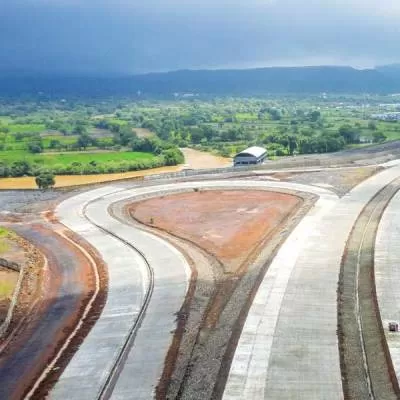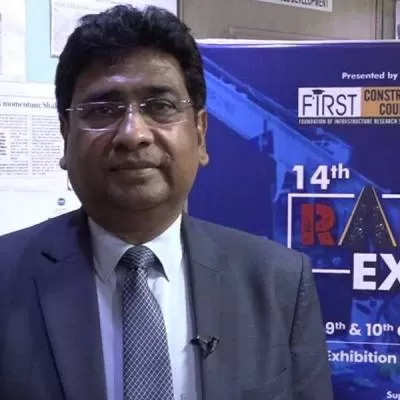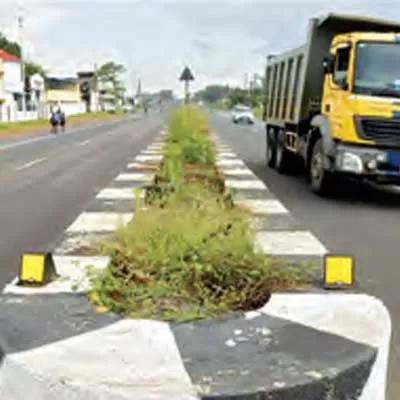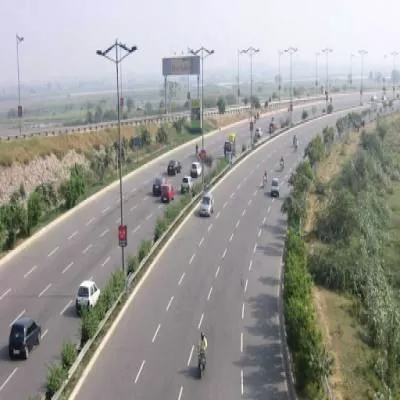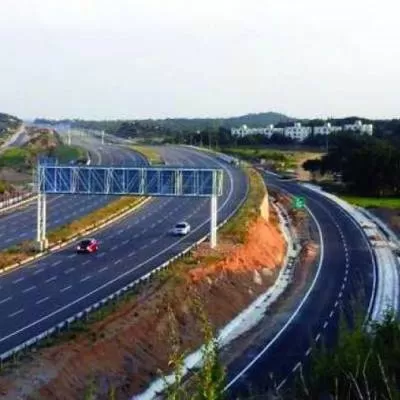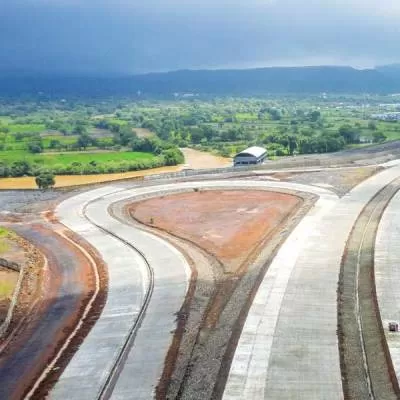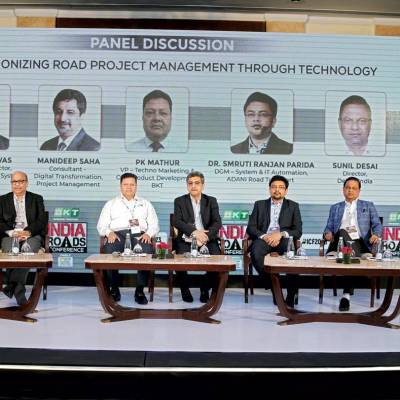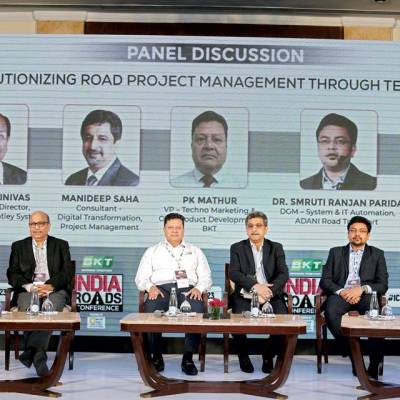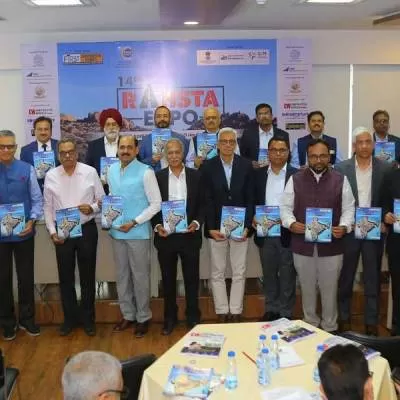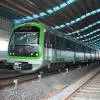- Home
- Infrastructure Transport
- ROADS & HIGHWAYS
- Paving glory

Paving glory
India has a healthy market for pavers. According to Anand Patel, CEO-Machines, Ammann Apollo India, ´Demand for wheeled pavers is estimated at about 620-640 machines while 75-80 tracked pavers are sold annually.´
Growth rate
Some industry voices say demand for pavers is currently increasing and expected to continue its upward tick.
At Volvo CE, we are seeing increased orders for all kinds of road-building equipment, including asphalt pavers, as a direct result of new projects coming on line,´says Dimitrov Krishnan, Vice President and Head, Volvo CE India. ´Sales are up by a significant double-digit percentage levels. We are expecting some easing off of demand later in 2016, but overall we are still anticipating a strong year for sales and healthy increases in demand into the coming three to five years.´
Now, new road projects are translating into greater demand for pavers, affirms Patel. Another perspective is that demand has grown for rental equipment. ´Although there is a spurt in demand for road equipment, it is for equipment on rent,´according to Hiten Kapadia, Business Line Manager, Atlas Copco Road Construction Equipment. ´Contractors prefer to wait for the situation to become sustainable before investing in a large equipment fleet. Most of this rental demand is for compactors; demand has only slightly stepped up for higher equipment like pavers and planers.´
Preferred pavers
Pavers can be classified into two categories on the basis of move-ability: Wheeled and tracked. By working width, they can be small, medium or large. Technology differentiates hydrostatic and mechanical pavers.
´Based on sales figures, India sees the highest demand for wheeled pavers,´says Patel.
´In terms of width, companies prefer machines capable of paving from 2.5 m to 5 m, which are suitable for a variety of projects including narrow rural and hilly roads. For their use in rural roads and for maintenance work, mechanical pavers are most in demand.´
´Generally, Indian buyers prefer wheeled variants of small pavers of range 5.5 m to 6 m when the requirement is ease of movement around site. If they buy pavers of greater width, they look for tracked pavers with more traction capacity and power,´said Kapadia of Atlas Copco, which offers the Dynapac range of wheeled and tracked pavers.
Overall, however, companies choose a paver based on the work site needs and size of the project, says Kapadia. But they may look for certain features beyond these categories: ´Top features in demand are adaptability to a variety of applications, reliability, user-friendliness, serviceability and fast setup.´
Market gap
With the launch of the made-in-India P5320B ABG tracked paver, Volvo expects to fill a gap in the market. ´Generally speaking, there is an overpopulation of larger, extendable up to 16 m pavers in India and paucity in the 5-7-m class,´opines Krishnan. The P5320B ABG tracked paver is ideal for medium and large-scale paving projects where widths range from 2.5 m to 7 m. Optional extensions to the unit´s standard 3-m track plates allow optimal paving width to be achieved.
Ammann Apollo India has recently come out with the medium-sized (8-m width) tracked paver model AP800.
Road construction companies taking on projects entailing the construction of pavements of width greater than 9 m can use pavers facilitating crown profiles, says Ramesh Palagiri, Managing Director & CEO, Wirtgen India. To this end, Wirtgen has introduced a new inset slip-form paver for concrete paving, the SP 94, a fully modular inset model on four steerable, swivelling crawler tracks to pave surfaces of width 2 m to 9.5 m and paving thickness up to 450 mm with crown profiles.
In asphalt paving, Vogele, a Wirtgen brand, has launched the Super 2100-3 paver in the new Dash 3 generation of machines. ´Capable of reliably starting up and operating in thin high-altitude air, thanks to the splitter gearbox of the Vogele EcoPlus package, this machine will be especially useful for companies constructing roads in mountainous regions,´says Palagiri. ´Its 3.06-m-long undercarriage provides for maximum traction and constant operating speed, even over difficult terrain.´
A feature that automatically disengages all the hydraulic pumps needed for ´traction´, ´conveyors and augers´ and ´compaction´ if the paver is idle for more than one minute helps save fuel.
Another 25 per cent cut in fuel costs transpires from the combination of an energy-optimised tamper drive, engine speed-dependent variable-speed fan and controlled hydraulic oil temperature circuit.
Time-saving value adds
Vogele´s Super 2100-3 paver features PaveDock Assistant and PaveDock functions, which ensure a rapid and safe transfer of the mix to the paver and AutoSet Plus, which allows the quick repositioning of the paver on the job site with prior settings. Atlas Copco´s F1800 and SD1800 Citypaver class machines are both offered in tracked and wheeled versions. With a laying capacity of 350 tonne per hour and the capacity to pave from 0.7 m to 4.7 m, the CityPaver also boasts a SetAssist feature whereby paving parameters can be stored and replicated in the next job site within seconds, thus assuring fast setup time. An advanced screed heating system ensures quick heating.
The superior Dynapac R300TVE rigid screed and a new version of the intelligent Pave Manager 2.0 control system for the large tracked Dynapac SD2550CS paver contribute to highest mat quality. This machine is best teamed with the Dynapac MF2500CS material feeder, a 2.5-m feeder combining easy and cost-effective transport with a high-performance conveying system that can transport 35 tonne of gravel, sand or asphalt to its destination in just 35 seconds. New models will undoubtedly pave the way for smoother rides.
Quick Bytes
- Highest demand for wheeled pavers; estimated at about 620-640 machines.
- Anticipation of a strong year for sales and healthy increases in demand in next three to five years.
- Growth in demand for rental equipment.
- Desire for more efficient and productive machinery.
Pavers for real-estate projects
´Generally speaking, township projects employ larger pavers (asphalt), but contractors also look for flexibility in equipment as new-build sites include a variety of road sizes in their design. Overall, there is a desire for more efficient and productive machinery, especially given the ambitious targets that are now applied to so much development work in India,´opines Dimitrov Krishnan, Vice President and Head, Volvo CE India.
´We prefer concrete pavers for their capacity (130-150 sq m per hour), easy mobility, and the longevity of the finished road,´says Raj K Vaid, Managing Head, Krishna Valley Vrindavan, and Consultant, Milestone Realcone. ´Concrete paved roads offering a smoother drive are much preferred by buyers of homes as well as commercial property.´
´We prefer outsourcing or renting pavers to avoid keeping owned equipment idle between projects and spending extra on renting storage space,´adds Vaid. ´Moreover, technology is ever-changing and renting means we can avail the latest machines offering higher productivity. Time and labour savings gained from using the latest technology mean we can complete township projects faster, a key priority.´
No takers for planers?
Asphalt plants, bitumen sprayers, compactors and kerbers are some of the ´regular´ associated equipment that companies buy with pavers. Market growth is expected to improve the prospects for planers, a product closely associated with pavers that the Indian market could have huge potential for.
´Low awareness and the tendency of Indian customers to be overcautious with new products, even internationally established ones, have resulted in slow acceptance of planers,´says Sunil Newatia, Managing Director, Suretech Infrastructure, which is promoting the Italian-made Simex planer in the country. ´Simex products are robust, sturdy and durable performers, ideal for Indian conditions. Their USP is higher cutting force at even low hydraulic flow. Plus, they can be used on both asphalt and concrete, are highly cost-effective compared to milling machines, make an ideal tool for minor road repairs and maintenance, and are useful for narrow roads.´
Opting for concrete blocks instead of paving
´We use interlocking concrete block pavement technology-based pavers for all our township projects spanning residential and commercial areas,´says Raj Pillai, Executive Director, Sobha. ´We find it better suited to such non-traffic areas around buildings and shopping complexes, light traffic areas like colony roads, car parks, and medium traffic areas like city streets. It is definitely more aesthetic.´ Interlocking concrete block pavements involve the construction of a conventional, properly profiled base course using road-making equipment, says Pillai. Then, instead of regular pavers, labour is employed to lay precast concrete paver blocks on thin, compacted bedding material. The paving is bound by edge restraints or kerbstones and block joints are filled.

- Charu Bahri
To share your views on the Paving Equipment market in India, write in at feedback@ConstructionWorld.in
Resurgence in road construction and real-estate development spells good news for providers of pavers. India has a healthy market for pavers. According to Anand Patel, CEO-Machines, Ammann Apollo India, ´Demand for wheeled pavers is estimated at about 620-640 machines while 75-80 tracked pavers are sold annually.´ Growth rate Some industry voices say demand for pavers is currently increasing and expected to continue its upward tick. At Volvo CE, we are seeing increased orders for all kinds of road-building equipment, including asphalt pavers, as a direct result of new projects coming on line,´says Dimitrov Krishnan, Vice President and Head, Volvo CE India. ´Sales are up by a significant double-digit percentage levels. We are expecting some easing off of demand later in 2016, but overall we are still anticipating a strong year for sales and healthy increases in demand into the coming three to five years.´ Now, new road projects are translating into greater demand for pavers, affirms Patel. Another perspective is that demand has grown for rental equipment. ´Although there is a spurt in demand for road equipment, it is for equipment on rent,´according to Hiten Kapadia, Business Line Manager, Atlas Copco Road Construction Equipment. ´Contractors prefer to wait for the situation to become sustainable before investing in a large equipment fleet. Most of this rental demand is for compactors; demand has only slightly stepped up for higher equipment like pavers and planers.´ Preferred pavers Pavers can be classified into two categories on the basis of move-ability: Wheeled and tracked. By working width, they can be small, medium or large. Technology differentiates hydrostatic and mechanical pavers. ´Based on sales figures, India sees the highest demand for wheeled pavers,´says Patel. ´In terms of width, companies prefer machines capable of paving from 2.5 m to 5 m, which are suitable for a variety of projects including narrow rural and hilly roads. For their use in rural roads and for maintenance work, mechanical pavers are most in demand.´ ´Generally, Indian buyers prefer wheeled variants of small pavers of range 5.5 m to 6 m when the requirement is ease of movement around site. If they buy pavers of greater width, they look for tracked pavers with more traction capacity and power,´said Kapadia of Atlas Copco, which offers the Dynapac range of wheeled and tracked pavers. Overall, however, companies choose a paver based on the work site needs and size of the project, says Kapadia. But they may look for certain features beyond these categories: ´Top features in demand are adaptability to a variety of applications, reliability, user-friendliness, serviceability and fast setup.´ Market gap With the launch of the made-in-India P5320B ABG tracked paver, Volvo expects to fill a gap in the market. ´Generally speaking, there is an overpopulation of larger, extendable up to 16 m pavers in India and paucity in the 5-7-m class,´opines Krishnan. The P5320B ABG tracked paver is ideal for medium and large-scale paving projects where widths range from 2.5 m to 7 m. Optional extensions to the unit´s standard 3-m track plates allow optimal paving width to be achieved. Ammann Apollo India has recently come out with the medium-sized (8-m width) tracked paver model AP800. Road construction companies taking on projects entailing the construction of pavements of width greater than 9 m can use pavers facilitating crown profiles, says Ramesh Palagiri, Managing Director & CEO, Wirtgen India. To this end, Wirtgen has introduced a new inset slip-form paver for concrete paving, the SP 94, a fully modular inset model on four steerable, swivelling crawler tracks to pave surfaces of width 2 m to 9.5 m and paving thickness up to 450 mm with crown profiles. In asphalt paving, Vogele, a Wirtgen brand, has launched the Super 2100-3 paver in the new Dash 3 generation of machines. ´Capable of reliably starting up and operating in thin high-altitude air, thanks to the splitter gearbox of the Vogele EcoPlus package, this machine will be especially useful for companies constructing roads in mountainous regions,´says Palagiri. ´Its 3.06-m-long undercarriage provides for maximum traction and constant operating speed, even over difficult terrain.´ A feature that automatically disengages all the hydraulic pumps needed for ´traction´, ´conveyors and augers´ and ´compaction´ if the paver is idle for more than one minute helps save fuel. Another 25 per cent cut in fuel costs transpires from the combination of an energy-optimised tamper drive, engine speed-dependent variable-speed fan and controlled hydraulic oil temperature circuit. Time-saving value adds Vogele´s Super 2100-3 paver features PaveDock Assistant and PaveDock functions, which ensure a rapid and safe transfer of the mix to the paver and AutoSet Plus, which allows the quick repositioning of the paver on the job site with prior settings. Atlas Copco´s F1800 and SD1800 Citypaver class machines are both offered in tracked and wheeled versions. With a laying capacity of 350 tonne per hour and the capacity to pave from 0.7 m to 4.7 m, the CityPaver also boasts a SetAssist feature whereby paving parameters can be stored and replicated in the next job site within seconds, thus assuring fast setup time. An advanced screed heating system ensures quick heating. The superior Dynapac R300TVE rigid screed and a new version of the intelligent Pave Manager 2.0 control system for the large tracked Dynapac SD2550CS paver contribute to highest mat quality. This machine is best teamed with the Dynapac MF2500CS material feeder, a 2.5-m feeder combining easy and cost-effective transport with a high-performance conveying system that can transport 35 tonne of gravel, sand or asphalt to its destination in just 35 seconds. New models will undoubtedly pave the way for smoother rides. Quick Bytes Highest demand for wheeled pavers; estimated at about 620-640 machines. Anticipation of a strong year for sales and healthy increases in demand in next three to five years. Growth in demand for rental equipment. Desire for more efficient and productive machinery. Pavers for real-estate projects ´Generally speaking, township projects employ larger pavers (asphalt), but contractors also look for flexibility in equipment as new-build sites include a variety of road sizes in their design. Overall, there is a desire for more efficient and productive machinery, especially given the ambitious targets that are now applied to so much development work in India,´opines Dimitrov Krishnan, Vice President and Head, Volvo CE India. ´We prefer concrete pavers for their capacity (130-150 sq m per hour), easy mobility, and the longevity of the finished road,´says Raj K Vaid, Managing Head, Krishna Valley Vrindavan, and Consultant, Milestone Realcone. ´Concrete paved roads offering a smoother drive are much preferred by buyers of homes as well as commercial property.´ ´We prefer outsourcing or renting pavers to avoid keeping owned equipment idle between projects and spending extra on renting storage space,´adds Vaid. ´Moreover, technology is ever-changing and renting means we can avail the latest machines offering higher productivity. Time and labour savings gained from using the latest technology mean we can complete township projects faster, a key priority.´ No takers for planers? Asphalt plants, bitumen sprayers, compactors and kerbers are some of the ´regular´ associated equipment that companies buy with pavers. Market growth is expected to improve the prospects for planers, a product closely associated with pavers that the Indian market could have huge potential for. ´Low awareness and the tendency of Indian customers to be overcautious with new products, even internationally established ones, have resulted in slow acceptance of planers,´says Sunil Newatia, Managing Director, Suretech Infrastructure, which is promoting the Italian-made Simex planer in the country. ´Simex products are robust, sturdy and durable performers, ideal for Indian conditions. Their USP is higher cutting force at even low hydraulic flow. Plus, they can be used on both asphalt and concrete, are highly cost-effective compared to milling machines, make an ideal tool for minor road repairs and maintenance, and are useful for narrow roads.´ Opting for concrete blocks instead of paving ´We use interlocking concrete block pavement technology-based pavers for all our township projects spanning residential and commercial areas,´says Raj Pillai, Executive Director, Sobha. ´We find it better suited to such non-traffic areas around buildings and shopping complexes, light traffic areas like colony roads, car parks, and medium traffic areas like city streets. It is definitely more aesthetic.´ Interlocking concrete block pavements involve the construction of a conventional, properly profiled base course using road-making equipment, says Pillai. Then, instead of regular pavers, labour is employed to lay precast concrete paver blocks on thin, compacted bedding material. The paving is bound by edge restraints or kerbstones and block joints are filled. - Charu Bahri To share your views on the Paving Equipment market in India, write in at feedback@ConstructionWorld.in


